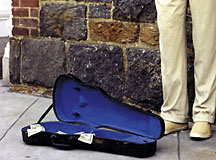Funding a Music Education by Christopher Bourne
/ December 12, 2005
Version française...
 Juggling
work, school and practising is always a challenge, but for many music students
making ends meet means taking on a part- time job. Musical talent and knowledge
can come in handy. La Scena Musicale looks at various ways students can
fund their musical training during the school year. Juggling
work, school and practising is always a challenge, but for many music students
making ends meet means taking on a part- time job. Musical talent and knowledge
can come in handy. La Scena Musicale looks at various ways students can
fund their musical training during the school year.
Paid gigs
Being paid to perform. This kind of work doubles as
practice time, and students learn valuable lessons about a performer's life.
Whether playing in community ensembles, for weddings or funerals, singing in
local churches, joining groups, or busking in the metro, students earn their
keep while keeping their chops in musical form. Plunging into this world will
help establish a network of contacts for later careers. Rates: varies
Teaching
Giving private lessons to beginners, junior musicians
and adults is another answer. Although voice and piano are more in demand,
there are students for most instruments. One can advertise with posters and
classified ads in local papers and LSM, or join a music school. Talented
pianists can find work as accompanists for aspiring singers. Rates: $15 to
$30/hr.
Music support
Music performance and promotion require a virtual army
of support staffing, from ushers to front-of-house staff, and library
assistants. Start with the school's concert hall then check local venues.
Rates: $8 to $10/hr.
Scholarships and Bursaries
Many schools have entrance scholarship programs and
some in-course awards for the top students. In addition, many community groups
and organisations offer various assistance programs to encourage talented young
musicians.
Tuition Rates Shopping
Tuition rates for music programs can vary greatly
across Canada. Tuition rates do not necessarily reflect the quality of
education. Research what each school has to offer, and how a higher tuition
rate benefits you. Quebec schools in particular are renowned for their
relatively low tuition rates for residents. Canadian students born outside
Quebec should investigate ways of becoming a resident, which can be as simple
as living in the province twelve months without going to school full time.
Teaching and Research Assistantships
Graduate students and undergraduate seniors often have
the option of working for a professor as either a teaching or a research
assistant. Teaching assistants help out with larger undergraduate classes,
often grading assignments. Research assistants in music will rarely be involved
in performance-related tasks, but rather ones involving music history, theory,
or electronic music. *
Version française... | 

